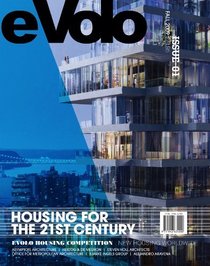Search -
eVolo 01 - Housing for the 21st Century
eVolo 01 Housing for the 21st Century
Author:
eVolo is an architecture and design journal (based in New York City) published twice-yearly focused on technology advances, sustainability, and innovative design for the 21st century. Our objective is to promote and discuss the most innovative ideas generated around the world. It is a medium to explore the reality and future of architecture and ... more »
Author:
eVolo is an architecture and design journal (based in New York City) published twice-yearly focused on technology advances, sustainability, and innovative design for the 21st century. Our objective is to promote and discuss the most innovative ideas generated around the world. It is a medium to explore the reality and future of architecture and ... more »
ISBN-13: 9780981665818
ISBN-10: 0981665810
Publication Date: 9/1/2009
Pages: 176
Edition: First
Rating: ?
ISBN-10: 0981665810
Publication Date: 9/1/2009
Pages: 176
Edition: First
Rating: ?
0 stars, based on 0 rating




